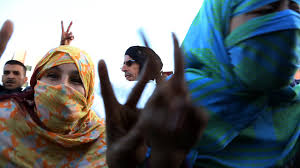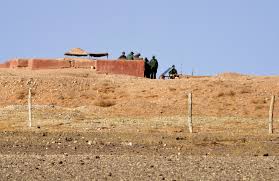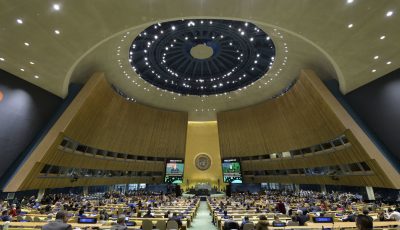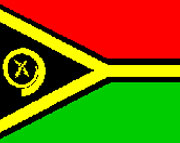In the recent years, Africa has been perpetuated in the media – both TV and print – as the symbol of poverty, hunger and oppression. The situation of women especially has been misinterpreted and they are seen as uneducated and uninvolved in the social and political construction of their prospective societies. The people of Africa we hear about and see in the media are starving refugee women and children. In this paper, I would like to present another image of African refugees as an example of women’s important role in the society. The purpose of this research paper is to look at how the Saharawi (natives of the Western Sahara) women have both directly and indirectly participated in the struggle for independence of the Western Sahara. I also attempt to look at the social structure that helped create an environment where more women are becoming involved and empowered. Through personal experience and examples of women who have lived first hand in this erupted region, I hope to give insight into the important role that women have played in more than three-decade-long struggle.

I come from the biggest refugee camp in the world. It has existed for such a long time in such a remote place that I imagine most people elsewhere do not even know about it. I belong to the Saharawi people of Western Sahara, a country currently occupied by Morocco. Western Sahara is situated in the desert region of northwest Africa and it is rich in minerals and oil. It is bordered from the north by Morocco, from the south by Mauritania, from the east by Algeria and Mauritania and from the west by the Atlantic Ocean. This region used to be a Spanish colony for over a century. When the Spaniards left the country, the people did not celebrate their independence for more than a couple of months when both Morocco and Mauritania doubly invaded the territory in 1975 (Hodges 5).
Three years later, Mauritania withdrew and Morocco took over the entire region. After sixteen years of violence, which led to the death of hundred of thousands, the kingdom of Morocco and the Polisario Front: the Movement for the Liberation of Saguia el Hamra and Rio de Oro signed a cease-fire in 1991. Three decades later, this conflict is still to be solved and more than 200,000 refugees still remain in the Algerian desert (Hodges 8).
Historically in the Saharawi nomadic life, women have been involved in many leadership positions in the society. Unlike in many Muslim and Arab societies, Saharawi women could inherit property and could subsist independently of fathers, brothers and husbands (Lippert 638). Moreover, women ruled the tents and played a major role in tribal life. Since most men spent a lot of time away from the frig (a group families or a camp) warring or trading, it was the women who had the full responsibility for everything. They watched over the cattle, took care of the children, the guests and the community as a whole. Moreover, women were the ones consulted when it came to tribal decision-making. There are historical accounts of women’s direct participation in the ait Arbeen’s meetings. Ait Arbeen used to be the highest political and social constitution in the Saharawi society and it was made up of representatives from the forty tribes in the region. In these meetings many issues are discussed concerning matters in the frig as well as in the nation as a whole. Similarly, it was the mothers and the grandmothers who decided upon the value of dowry for the wedding of any girl. Although, most if not all marriages were arranged amongst families and the girls were not to be consulted. This in one way was a struggle for young girls and so nowadays arranged marriages are becoming less common.
When the Polisario Front was founded to fight against Spanish colonialism, Saharawi women responded immediately and started participating in this struggle. The women’s first activities were conventional. They started recruiting their husbands and sons to join the front, provided shelter for the Saharawi Popular Liberation Army (SPLA) members and contributed materially to aid the struggle. Later on, their role widened and they founded the National Union of Saharawi Women (NUSW) in 1974, which participated alongside with the Polisario Front militarily and politically (Lippert 642). When the bloody war started between Morocco and the Polisario guerilla fighters, women from the NUSW were ready to take action.
Many young women took up arms and started to fight with the SPLA militants. In addition, they guarded prisoners captured during the war. One of the first martyrs of the war was Chaia Ahmed Sein who was a woman. Moreover, the death of several women was occasionally reported from the different battles between the Front and the Moroccan army. In addition, Saharawi women soldiers took charge of people fleeing the major towns of the Western Sahara for refuge in the Algerian desert. They were the ones who organized shelter, supplies and protection for the refugees who were primarily women and children.
Now in the camps, women play the most important role in all sectors. The Saharawi refugee camps in southern Algeria are 90% women and children (Lawless et al. 190). This is due to the fact that the majority of able men joined Polisario Front’s army and were fighting against Morocco. It was the women who created the camps and still are the most responsible ones in all aspects of life for the refugees. Saharawi women occupy most of the basic jobs in the camps: education, administration and health. At the present, it is believed that more than 90% of the teachers are women. In contrast, in the early years of the camp, there were only two women teachers because females were not allowed to study during the Spanish colonialism.
Similarly, the majority of the nurses are females; there are also few female doctors who earned their degrees in foreign countries such as Cuba. My mother for instance graduated from a Libyan university with a degree in education and so she has been a teacher for over twenty years in the camps. In addition, she was just elected as a primary school director this year. This is also very common amongst women nowadays. Despite the fact that all jobs are unpaid, everyone work for the good of the whole community. They all want their children to be the future generation of a free Western Sahara and build an independent nation like other countries. In the same way, my neighbor is currently one of the two surgeons in the camps. She studied in Cuba for twenty-four years and came back to serve the community.





